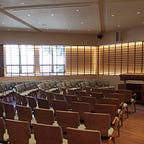Rethinking and redefining freedom
What lies up there? There is none as long as there is no “there.”
True freedom is accepting the fact that there is such a thing you may do but choose to not do. And your choice of not doing it must not be coupled with reservations commonly referred to as “what-ifs.” It is the resistance to an urge to go beyond by knowing that what is beyond is forbidden. Or, bearing in mind that there is no beyond as long as you think there is no such a thing. Therefore, the locus of freedom is in contentment.
The act of violating God’s instruction, as it were for Adam and Eve, is a statement of the two’s discontentment of what God has given them. Hence, an insult to God. The reason there is: Why go beyond the premises which God has set first and foremost?
Freedom is embracing our fate; freedom from what you can be; freedom from chasing your foreseeable highest potential; freedom from what you can gain and possess; freedom from the lot you can achieve.
However, seeing the human condition that we have come about thus far, can we argue that the promise of human freedom, or simply, the freedom version of Capitalism, is flawed? Is the possession of the world (i.e., living in a house, driving a car, dining for a sumptuous meal, etc) is contrary to God’s plan? Is “good lifestyle” necessarily bad? Is human achievement, i.e., our science progressing each day at a fast rate, contrary to God’s design for us to live off the land?
Ultimately, a question needs to be pressed: What if God took advantage of our sins in order to save His energy in the propelling forward of humankind?
But as it unfolds, we may argue that when God assigned Adam (and his co-worker Eve) to take charge of the garden, God was actually at-rest. Because right after He created man, we can read, God took His rest.
Or what if the failure of Adam and Eve to follow God’s words speaks volumes of how untrustworthy humans are? That we can never cooperate with our Boss, because of our constant drive for “what lies up there,” or simply, our greed. Basically, perhaps, in our very own minds, we are programmed to never submit to authorities and be the authority instead. We wanted to replace God’s design with ours. And as an attachment to that goal, we must replace God with ourselves; taking the role which we must never do.
Ultimately, going back to the thesis of this paper, true freedom is our acceptance of our fate that we cannot replace God’s design, because ours will never match His. And by replacing His design, we burden ourselves by keeping our design working and functioning. Whereas, our freedom is ill-conceived that it is actually a burden in disguise.
We think freedom is what we can be, which is vexing and, literally, an independence of sorts. Our version of freedom is coupled with burden, but God’s is pure freedom. Because we bother thinking of our possessions and cares since we know we are the author of our fate, but in God’s version of freedom, His design keeps us away from the fundamental cares: food, shelter, and so on.
(While we understand that freedom comes with burdens, that is, exerting an effort for our supply and when the existence of supply finally suffices, we can be “free” of this care, hence the “by the sweat of your brow, you shall eat” pronouncement, freedom that God once offered is far more different: We live. And we are provided for by God Himself.)
Finally, our freedom is self-sabotaging from the very point where freedom is conceived, because freedom is built on a fragile, brittle lie. We have prided ourselves with freedom which can never be freedom in the first place. We have only cheerfully consigned ourselves to utter perdition. But what can we do?
We were born in an age where there is an established system already. We just have to fit into this system. But this remains the pseudo freedom. And even if we want to go back to the garden, we cannot. No one even knows where that is. How can we think of this, then?
Keep the system going, but never think of it as perfect. Get into Capitalism, but never be a slave of it. Only God can save us. But who is God? He is God. The God of Abraham, of Isaac, of Jacob.
(Detour: God, often, is referred to as God of Abraham, of Isaac, of Jacob in the Bible because no one knows who God is. And these names are mere references to God.)
We earn our freedom, but as times pass by, that as we struggle to set our wealth straight as our source of assurance, we have our freedom at the latter part of our lives, or in the worse case, at the point of our death. Whence, our descendants benefiting from it.
